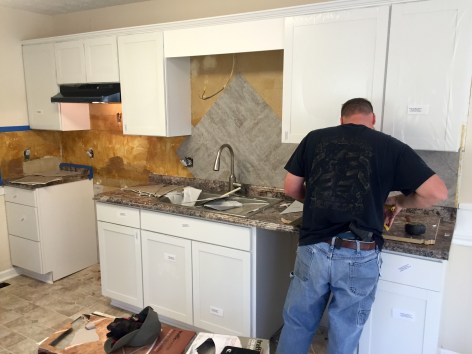COVID, cabinets and courthouses
The effects of COVID-19 have reached many facets of our lives in 2020. On the real estate business level, they have has affected our purchasing capabilities — specifically how we’ve been able to purchase materials on our rehabs. It started out with 5/4 boards not being available for building decks. Then the shortage moved into other lumber areas before the eventual price increase on almost all building material really hit hard in September and October.
When I noticed that, I went to all my suppliers and asked where they predicted material shortages in the near future. One of the things on their lists was cabinets.

This news was bad because we were going to need cabinets to complete two full kitchens on our rehabs at the time.
Armed with that knowledge, we went ahead and put in our order for cabinets before there was a shortage. That was on Sept. 3. As I’m writing this column two full months later, we still have not received our order. (update: they came in on 11-12.)
There have been other challenges in regard to material availability with appliances and even tool purchases, but these all had to do with manufacturers being shut down. But COVID-19 shut down other places, like our court houses, which affected us landlords too.
Thankfully, we took time to find rental applicants who could do the four jobs of a tenant which are: 1. Take care of house. 2. Pay on time. 3. Be comfortable to work with by staying in good communication and being respectful. 4. Be a good neighbor.
Because we made sure they could do job No 2., we’ve maintained good communication with our tenants during the shutdown. We’ve even been able to work with the ones who needed a little financial grace.
The only hiccups we have had came from an inherited tenant. This was someone who was already installed and under lease when we bought the property.

There were two things wrong with this situation. First, when you buy a property with a tenant in it, you are buying subject-to the existing lease. The lease we inherited was a one-page document that basically said when and how much the tenant should pay and that there was no deposit collected.
The second thing was that the tenants had learned poor communication and property maintenance habits from the previous landlord. Since the lease didn’t say anything about the tenants responsibilities of upkeep of the property, we had to wait until they violated the payment portion of the lease to remedy the situation.
They didn’t pay, and they didn’t communicate, so we filed for dispossessory. They were served, they answered the summons and a court date was set.
Now, I didn’t know what to expect of the courthouse since I hadn’t been there since the shutdown. But I did my normal court time routine. I made a bullet point outline for the judge that clearly and concisely showed where the tenants had missed payment, how we contacted them and when we sent the pay or quit notice, along with a few other things that were specific to the case. I then printed supporting documents, highlighted the relevant portions and had them in order so that the judge could find them easily.

This process is very important if you are going to court. Giving the judge the facts that he needs, and not inundating him with information will help him to see your point and not have to wrestle with lots of details trying to make a judgement.
On the day of court, everything was normal at the Gordon County Courthouse except that they took my temperature when I came in and all the doors to the offices were shut.
Our case went before Judge Baines. I liked him a lot. I found him to be cordial, evenhanded and resolution oriented. These are good qualities to find in a judge. And just so you know, we didn’t win. Our case got dismissed. The reason was we messed up when we filed the affidavit for dispossessory online.
You see, we normally do it in person at the courthouse. The lease we inherited had a signer and a co-signer. On the online form, it was easy to put the signer’s name in, but there was an extra button we needed to press to add the co-signer. We missed the button and assumed the co-signer would fall under “all other occupants” on the affidavit. They did not fall into that category and the case was rightly dismissed because we could not just dispossess one party and not the other.
That was big lesson. Had we filled out the affidavit at the courthouse like normal, we wouldn’t have done this. But, since the online process is strongly advised due to COVID-19, well, we got to learn a lesson.
Joe and Ashley English buy houses and mobile homes in Northwest Georgia. For more information or to ask a question, go to www.cashflowwithjoe.com or call Joe at 678-986-6813.
